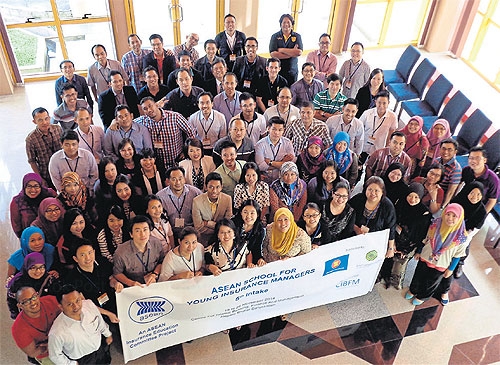Leadership quality through the eyes of Asean managers
- Published: Nov 27, 2014 07:24
- Writer: Sorayuth Vathanavisuth | 7,021 viewed
Whenever we put two or more people together, we can get a lot more productivity than we would from just one person if we handle them right. This was my experience at the Asean School for Young Insurance Managers (AYIM) in Brunei, where I conducted a course on people management last week for 80 participants.

Participants in the Asean School for Young Insurance Managers gather in Brunei this month.
In my presentation on people management, the focus on leadership was definitely what the audience wanted to hear. I had begun by talking about human resource issues, which are close to their day-to-day lives but basically business as usual with no excitement. When I began to discuss leadership, they reacted as if they wanted to learn more. Their enthusiasm impressed me.
Although the AYIM programme is aimed at managers aged below 40, I have observed that people aged 35-45 are in their prime years for learning, at least when it comes to the business world. They are ready to take on bigger and higher-profile assignments. Listening to the opinions and discussions among this younger (than me) generation was encouraging when thinking of the future of business in Asean.
When I asked my audience about the characteristics of leaders, their responses were similar to those of famous experts in the field. In this regard, before I elaborate on what we discussed, let me share with you the characteristics of leaders from one of my favourite books, On Becoming a Leader, by Warren Bennis:
Clear (guiding) vision: Leaders should have a clear idea of what to do — professionally and personally. They must have the strength to persist in the face of setbacks, even failure.
Conviction (passion): This underlying passion for the promises of life, combined with a very particular passion for a vocation, a profession, a course of action. In conclusion, leaders love what they do.
Courage (daring): Leaders are willing to take risks, experiment and try new things.
Conscientiousness (integrity): Leaders should know their own strengths and weaknesses. Integrity is derived from self-knowledge, candour and maturity. Leaders must be true to their own principles and have learned from experience how to learn from and work with others.
Confidence (trust): Leaders must earn people’s trust.
Curiosity: This is the foundation of innovation and analytical thinking. Leaders should wonder about everything and want to learn as much as possible.
In their workshops, the AYIM participants formed a profile of the ideal leader based on the following qualities:
Lead by example: Behave at all times as a role model. Leaders should be proactive and work harder than their people.
Behave with integrity and fairness to all.
Listen to others instead of giving instructions: Communicating effectively is critical. The “town hall” meeting is one format the participants favoured.
Coach and mentor team members in the right direction: Leaders should regularly coach their people so they can find the way out by themselves when they face difficult situations. Mentoring is very helpful for people who share the same kind of work.
Provide feedback while encouraging people to give feedback regularly. The key is to do it right.
Trust in people and build trust among team members: Great leaders believe in their team members and thus inspire trust.
Empower others: Encourage initiative, innovation and risk-taking. Delegation alone may not get the job done. People should be given full responsibility, but whenever they face difficulty they should report or consult. This way, leaders and those under them can work together.
Inspire and motivate people to move forward. Learn to bring out the best in people. Many participants consider this quality one of the most important a leader should have.
Embrace continuous learning to expand knowledge and improve operations.
Be visionary but provide clear direction to subordinates.
Be decisive and have the courage to make tough decisions.
Think outside the box and dare to take risks: Leaders should embrace innovation and find new ways of doing things all the time.
Have a positive mindset and an optimistic view: These qualities encourage people to move forward without hesitation.
Focus on finding and grooming the right talent. Developing more leaders is the thing that effective leaders do regularly. Train a second layer of executives to be future successors.
Walk the talk and be approachable. Leaders should be flexible and empathise with employees when they are in trouble.
Encourage acceptance of differentiation and diversity.
Be authentic and sincere. Although leaders may know more and think faster than the others, they usually don’t show it but tend to be modest instead.
Show emotional stability or EQ (emotional quotient).
The above characteristics form quite a long list, and given more time I am confident these young Asean managers would have been able to refine their ideas further. The encouraging thing is that despite their different backgrounds and nationalities, they came up with similar universally shared ideas among themselves. I am glad I had the opportunity to meet them and be part of their future successes.
Sorayuth Vathanavisuth is principal consultant and executive coach at the Center for Southeast Asia Leadership and lectures at Mahidol University’s College of Management. His areas of interest are corporate strategy, executive coaching and leadership development. He can be reached at sorayuth@sealeadership.com


